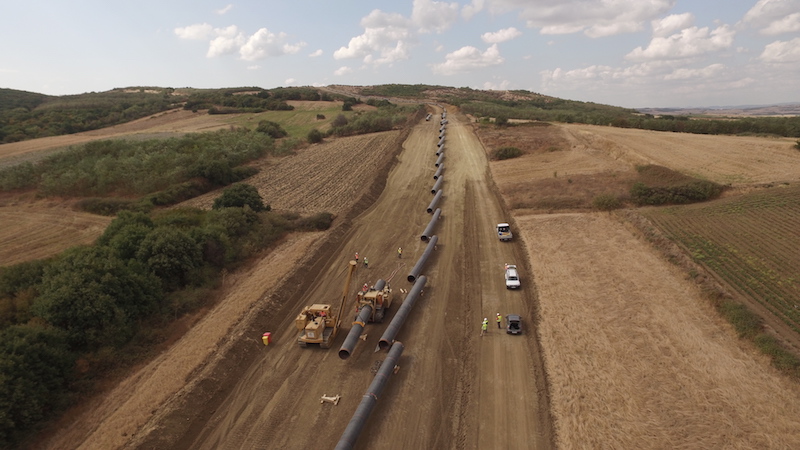The European Investment Bank (EIB) approved loans worth €1.5 billion ($1.86bn) on Tuesday to a pipeline project to ship gas from Azerbaijan to Italy.
The loans went to the Trans Adriatic Pipeline (Tap), a section of pipe that will complete a 3,500km continent-joining conduit known as the Southern Gas Corridor. The Tap starts in northern Greece, traverse Albania and run beneath the sea to southern Italy.
The announcement by the EIB board brings the total public backing for Europe’s biggest fossil fuel project to $3.5bn. The European Bank for Reconstruction and Development, World Bank and Asian Infrastructure Investment Bank have already committed loans.
Environment campaigners responded with dismay, arguing that large investments in fossil fuels would discourage investment in cleaner forms of energy.
“We witnessed today a historic mistake by the EIB,” said Xavier Sol, director of Counter Balance. “A self-styled green finance champion which has shown its true colours. The bank is showing its poor consideration of climate challenges, as well as its disregard for the problematic human rights situation in Turkey and Azerbaijan.”
EU: Bank to decide loan to project linked to Azeri laundromat scheme
Colin Roche, extractives campaigner for Friends of the Earth Europe, said: “The European Investment Bank is now shamelessly locking Europe into decades of fossil fuel dependency, even as the window for fossil fuel use is slamming shut.”
Some of the gas will be drawn from fields in the Azerbaijani section of the Caspian sea. Pipeline operators have also signed agreements to allow Russia to use the pipeline. Last year Azerbaijan withdrew from the global extractive industry watchdog after repeated failures to meet human rights standards. But multilateral banks have not been deterred.
Climate Home News reported last year that the EIB had been lobbied by the European Commission vice president Maroš Šefčovič and climate and energy commissioner Miguel Arias Cañete to lend their support to the project.
On Tuesday, a spokeswoman said the commission welcomed the decision: “Forming part of the Southern Gas Corridor, Tap is an important project that will increase Europe’s security of supply by diversifying gas routes and contributing to market integration and the energy transition.
“By bringing Caspian gas to the EU, the Southern Gas Corridor is a key project for EU energy security, in line with the EU’s diversification strategy under the Energy Union Strategy. Tap is also a European energy project of common interest.”
There was no response to a question Climate Home News asked about the climate change impacts of the pipeline.
What is the Southern Gas Corridor?
BP calls it “arguably the global oil and gas industry’s most significant and ambitious undertaking yet”. It is a three part pipeline that, if completed, will carry gas from the Shah Deniz 2 oil field in Azerbaijan’s Caspian Sea through Georgia, Turkey, Greece, Albania into southern Italy.
Sections:
- South Caucasus Pipeline (SCP) – Azerbaijan, Georgia
- Trans Anatolian Pipeline (Tanap) – Turkey
- Trans Adriatic Pipeline (Tap) – Greece, Albania, Italy
Source: TAP
Ownership: At least 11 different companies are involved in the corporate ownership structures of the various sections. Major players include BP, Azerbaijan’s state oil company SOCAR, Turkish Petroleum, Petronas, Lukoil, Total and Snam.
Public finances: The Asian Development Bank is considering a loan. The European Bank for Reconstruction and Development, World Bank and Asian Infrastructure Investment Bank have committed $500m, $500m and $600m respectively. The European Investment Bank has approved a loan of $1.86bn.

